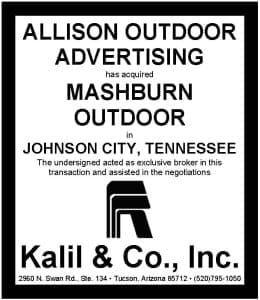 By Richard Rothfelder, Rothfelder and Falick
By Richard Rothfelder, Rothfelder and Falick
A good outdoor lease needs to protect your interests when a landlord terminates a lease. Smith v Outdoor Systems 14-00-00474-CV, 2002 WL 370200 (Tex. App.—Houston [14th Dist.] Mar. 7, 2002, pet. denied) illustrates some end of lease issues.
Introduction
This is a declaratory judgment action determining ownership of billboard under terms of billboard lease. A Harris County District Court entered a declaratory judgment that the lessee (National Advertising Company, now Outfront Media) owned the billboard and could remove it. The landowner (Smith) appealed. The Texas Court of Appeals affirmed, holding the lease did not provide for forfeiture of the billboard even though National failed to remove it before the termination date, and rejecting a provision of the lease interpreted by the landowner to the contrary.
Summary
- National entered into a lease with Smith to erect and maintain a billboard on Smith’s property. The relevant provisions of the lease provided that “[lessee] shall remain the owner of all advertising signs…erected by [lessee], and that, notwithstanding the fact that the same constitute real estate fixtures, [lessee] shall have the right to remove said signs…any time during the term of the lease.” The lease also provided “[landlord]…may terminate this lease on 60 days written notice.. .and the payment … of $35,000.”
- Smith sent National a letter of termination of the lease, enclosed a check for the $ 35,000 termination fee; however, National failed to remove the billboard.
- Smith alleged in the lawsuit that National had breached the lease by failing to pay the amount due under the lease, and that he acquired ownership of the billboard upon National’s failure to remove it “during the term of the lease.” Both parties sought a declaratory judgment to determine ownership of the billboard.
- At trial, the jury found that National did not fail to remove the billboard within a reasonable amount of time following the termination of the lease. The trial court entered a declaratory judgment that National owned the billboard and can remove it.
- Smith appealed, arguing that the trial court erred in ruling that National, rather than Smith, owned the billboard in question because ownership of it vested in Smith when National failed to remove the billboard before the date of termination of the lease.
- Smith interpreted portions of the lease to mean that National had a right to remove the billboard only during the term of the lease; that the lease terminated 60 days after Smith’s notice of termination; National failed to remove the billboard prior to termination date; after the termination date, National no longer had any right to remove the billboard; the billboard became part of the property when National lost its right to remove it; and ownership in the billboard vested in Smith.
- However, the Court did not agree with Smith that the lease provided a forfeiture of the billboard if National failed to remove it before the termination date. The Court agreed with the trial court’s determination that National owned the billboard, reasoning that Smith could not cite any lease provision or legal authority stating that a failure to remove the billboard within a reasonable time of termination would result in National’s forfeiture of the billboard.
- The Court held that the jury’s finding that National did not fail to remove the billboard within a reasonable time after termination could have been because Smith was claiming ownership, as evidenced by Smith’s letters to National stating that the billboard belonged to him, indicating that the billboard had become a fixture on his property, and warning any attempt by National to remove it would be considered a trespass.
- In addition, the Court held that the trial court did not err by refusing to submit a jury question concerning a default by National because, as a matter of law, National could not have been in default of the lease. The lease required monthly rent payments and National timely delivered checks to Smith for the months in question. Smith held the rent checks for months following the termination of the lease. During that time National had closed the account.
- The Court held that a tenant has no obligation to pay rent after the lease has been terminated. Additionally, the lease did not provide any stipulations that the parties maintain open accounts after the lease expired or was terminated. Therefore, The Court held the trial court did not err in refusing to ask the jury whether National was in default of the lease at the time its checks were dishonored.
Takeaways
(1) Forfeitures are not favored in the law, as such, courts are not likely to declare a forfeiture unless it is compelled by the language of the agreement and that language cannot be construed in any other way. However, exercise caution when entering into a lease agreement with a forfeiture clause.
(2) Before signing off on a lease agreement, make certain the lease provides a provision regarding who retains ownership of the billboard during and after the termination of the lease.
(3) Include a provision in the lease for removal of the billboard at the conclusion of the agreement.
(4) A provision in the lease requiring parties to maintain open bank accounts for a certain period of time after the conclusion of the lease may prevent any unclaimed payments from being dishonored by the financial institution.
[wpforms id=”9787″]
Paid Advertisement

















